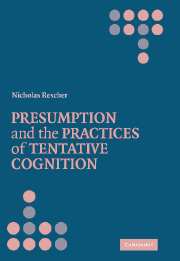Book contents
- Frontmatter
- Contents
- Preface
- Presumption and the Practices of Tentative Cognition
- 1 The Legal Roots Of Presumption
- 2 Presumption and Burden of Proof
- 3 Cognitive Presumption and Truth
- 4 Validating Cognitive Presumptions
- 5 Presumption and Inquiry
- 6 Default Reasoning
- 7 Presumption and Trust
- 8 Presumption and Communication
- 9 Presumption in Science and Beyond
- 10 Specificity Prioritization and the Primacy of the Particular
- 11 Dismissing Extremely Remote Possibilities
- Conclusion
- Bibliography
- Index of Names
6 - Default Reasoning
Published online by Cambridge University Press: 24 July 2009
- Frontmatter
- Contents
- Preface
- Presumption and the Practices of Tentative Cognition
- 1 The Legal Roots Of Presumption
- 2 Presumption and Burden of Proof
- 3 Cognitive Presumption and Truth
- 4 Validating Cognitive Presumptions
- 5 Presumption and Inquiry
- 6 Default Reasoning
- 7 Presumption and Trust
- 8 Presumption and Communication
- 9 Presumption in Science and Beyond
- 10 Specificity Prioritization and the Primacy of the Particular
- 11 Dismissing Extremely Remote Possibilities
- Conclusion
- Bibliography
- Index of Names
Summary
Default Inference
The topic of default reasoning also affords instructive insights into the nature of presumptions. A default in logic is a fall-back position in point of conclusion-drawing – one to which we can appropriately resort when circumstances prove uncooperative. But of course things ought not to go wrong in logic. So what is going on here?
Orthodox inferential reasoning proceeds via logically valid inference processes which do – and must – proceed from true premises to true conclusions. They review the inherent connections coming actually or assumptively accepted commitments. Logic functions within the limits of the given. By contrast, default reasoning – which involves an information gap between premises and conclusion – goes beyond this into uncharted territories. In consequence, plausible (though sometimes false) premises will lead to plausible (though possibly false) conclusions.
The logical validity of inference rules in standard (truth-functional) logic is determined on an input-output basis, a valid rule being one that will invariably yield true outputs (conclusions) from true inputs (premises). All such inference rules will faithfully and unfailingly transmit the truth of premises to the conclusions. By contrast, the inference processes of default logic are such that the truth – real or suppositional – of the premises does not assure the truth of the conclusion but will at most establish that conclusion as contextually plausible. Such inferences are ampliative: the conclusion can go beyond what the premises guarantee.
- Type
- Chapter
- Information
- Presumption and the Practices of Tentative Cognition , pp. 76 - 87Publisher: Cambridge University PressPrint publication year: 2006
- 1
- Cited by



